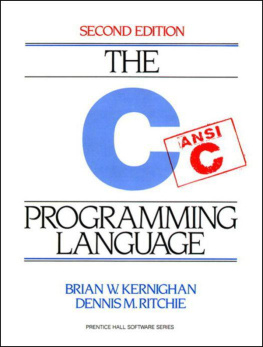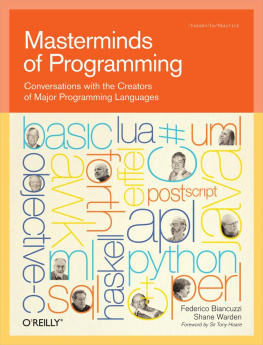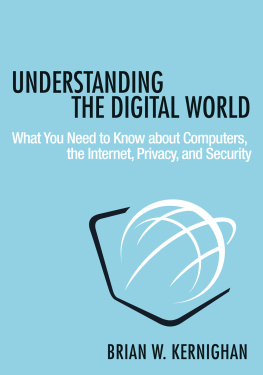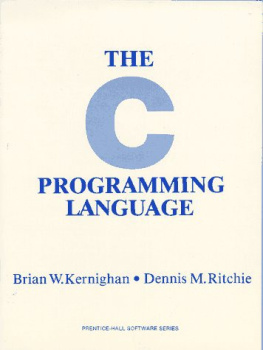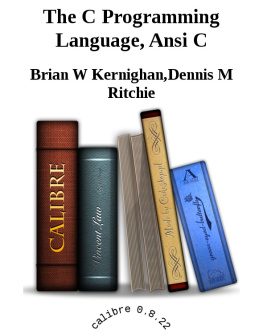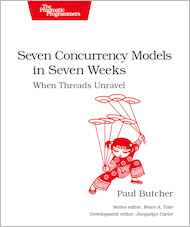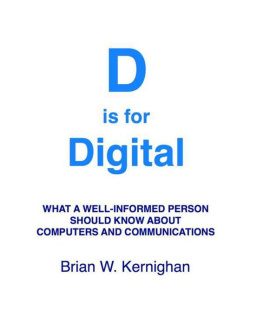Kernighan Brian W. - The Practice of Programming
Here you can read online Kernighan Brian W. - The Practice of Programming full text of the book (entire story) in english for free. Download pdf and epub, get meaning, cover and reviews about this ebook. City: Boston etc, year: 2006;1999, publisher: Pearson Education Limited (US titles);Addison-Wesley, genre: Home and family. Description of the work, (preface) as well as reviews are available. Best literature library LitArk.com created for fans of good reading and offers a wide selection of genres:
Romance novel
Science fiction
Adventure
Detective
Science
History
Home and family
Prose
Art
Politics
Computer
Non-fiction
Religion
Business
Children
Humor
Choose a favorite category and find really read worthwhile books. Enjoy immersion in the world of imagination, feel the emotions of the characters or learn something new for yourself, make an fascinating discovery.

- Book:The Practice of Programming
- Author:
- Publisher:Pearson Education Limited (US titles);Addison-Wesley
- Genre:
- Year:2006;1999
- City:Boston etc
- Rating:3 / 5
- Favourites:Add to favourites
- Your mark:
- 60
- 1
- 2
- 3
- 4
- 5
The Practice of Programming: summary, description and annotation
We offer to read an annotation, description, summary or preface (depends on what the author of the book "The Practice of Programming" wrote himself). If you haven't found the necessary information about the book — write in the comments, we will try to find it.
The Practice of Programming — read online for free the complete book (whole text) full work
Below is the text of the book, divided by pages. System saving the place of the last page read, allows you to conveniently read the book "The Practice of Programming" online for free, without having to search again every time where you left off. Put a bookmark, and you can go to the page where you finished reading at any time.
Font size:
Interval:
Bookmark:
ePUB is an open, industry-standard format for eBooks. However, support of ePUB and its many features varies across reading devices and applications. Use your device or app settings to customize the presentation to your liking. Settings that you can customize often include font, font size, single or double column, landscape or portrait mode, and figures that you can click or tap to enlarge. For additional information about the settings and features on your reading device or app, visit the device manufacturers Web site.
Many titles include programming code or configuration examples. To optimize the presentation of these elements, view the eBook in single-column, landscape mode and adjust the font size to the smallest setting. In addition to presenting code and configurations in the reflowable text format, we have included images of the code that mimic the presentation found in the print book; therefore, where the reflowable format may compromise the presentation of the code listing, you will see a Click here to view code image link. Click the link to view the print-fidelity code image. To return to the previous page viewed, click the Back button on your device or app.
Brian W. Kernighan
Rob Pike

Boston San Francisco New York Toronto Montreal
London Munich Paris Madrid
Capetown Sydney Tokyo Singapore Mexico City
Many of the designations used by manufacturers and sellers to distinguish their products are claimed as trademarks. Where those designations appear in this book, and Addison-Wesley were aware of a trademark claim, the designations have been printed in initial capital letters or in all capitals.
The author and publisher have taken care in the preparation of this book, but make no expressed or implied warranty of any kind and assume no responsibility for errors or omissions. No liability is assumed for incidental or consequential damages in connection with or arising out of the use of the information or programs contained herein.
The publisher offers discounts on this book when ordered in quantity for special sales. For more information, please contact:
Pearson Education Corporate Sales Division
201 W. 103rd Street
Indianapolis, IN 46290
(800) 428-5331
Visit AW on the Web: www.awprofessional.com
This book was typeset (grap|pic|tbl|eqn|troff -mpm) in Times and Lucida Sans Typewriter by the authors.
Library of Congress Cataloging-in-Publication Data
Kernighan, Brian W.
The practice of programming / Brian W. Kernighan, Rob Pike.
p. cm. --(Addison-Wesley professional computing series)
Includes bibliographical references.
ISBN 0-201-61586-X
1. Computer programming. I. Pike, Rob. II. Title. III. Series.
QA76.6 .K48 1999
005.1--dc21 99-10131
CIP
Copyright 1999 by Lucent Technologies.
All rights reserved. No part of this publication may be reproduced, stored in a retrieval system, or transmitted, in any form, or by any means, electronic, mechanical, photocopying, recording, or otherwise, without the prior consent of the publisher. Printed in the United States of America. Published simultaneously in Canada.
ISBN 0-201-61586-X
Text printed in the United States on recycled paper at RR Donnelley in Harrisonburg, Virginia.
Twenty-second printing, February 2013
Have you ever...
wasted a lot of time coding the wrong algorithm?
used a data structure that was much too complicated?
tested a program but missed an obvious problem?
spent a day looking for a bug you should have found in five minutes?
needed to make a program run three times faster and use less memory?
struggled to move a program from a workstation to a PC or vice versa?
tried to make a modest change in someone elses program?
rewritten a program because you couldnt understand it?
Was it fun?
These things happen to programmers all the time. But dealing with such problems is often harder than it should be because topics like testing, debugging, portability, performance, design alternatives, and stylethe practice of programmingare not usually the focus of computer science or programming courses. Most programmers learn them haphazardly as their experience grows, and a few never learn them at all.
In a world of enormous and intricate interfaces, constantly changing tools and languages and systems, and relentless pressure for more of everything, one can lose sight of the basic principlessimplicity, clarity, generalitythat form the bedrock of good software. One can also overlook the value of tools and notations that mechanize some of software creation and thus enlist the computer in its own programming.
Our approach in this book is based on these underlying, interrelated principles, which apply at all levels of computing. These include simplicity, which keeps programs short and manageable; clarity, which makes sure they are easy to understand, for people as well as machines; generality, which means they work well in a broad range of situations and adapt well as new situations arise; and automation, which lets the machine do the work for us, freeing us from mundane tasks. By looking at computer programming in a variety of languages, from algorithms and data structures through design, debugging, testing, and performance improvement, we can illustrate universal engineering concepts that are independent of language, operating system, or programming paradigm.
This book comes from many years of experience writing and maintaining a lot of software, teaching programming courses, and working with a wide variety of programmers. We want to share lessons about practical issues, to pass on insights from our experience, and to suggest ways for programmers of all levels to be more proficient and productive.
We are writing for several kinds of readers. If you are a student who has taken a programming course or two and would like to be a better programmer, this book will expand on some of the topics for which there wasnt enough time in school. If you write programs as part of your work, but in support of other activities rather than as the goal in itself, the information will help you to program more effectively. If you are a professional programmer who didnt get enough exposure to such topics in school or who would like a refresher, or if you are a software manager who wants to guide your staff in the right direction, the material here should be of value.
We hope that the advice will help you to write better programs. The only prerequisite is that you have done some programming, preferably in C, C++ or Java. Of course the more experience you have, the easier it will be; nothing can take you from neophyte to expert in 21 days. Unix and Linux programmers will find some of the examples more familiar than will those who have used only Windows and Macintosh systems, but programmers from any environment should discover things to make their lives easier.
The presentation is organized into nine chapters, each focusing on one major aspect of programming practice.
discusses programming style. Good style is so important to good programming that we have chosen to cover it first. Well-written programs are better than badly-written onesthey have fewer errors and are easier to debug and to modifyso it is important to think about style from the beginning. This chapter also introduces an important theme in good programming, the use of idioms appropriate to the language being used.
Algorithms and data structures, the topics of , are the core of the computer science curriculum and a major part of programming courses. Since most readers will already be familiar with this material, our treatment is intended as a brief review of the handful of algorithms and data structures that show up in almost every program. More complex algorithms and data structures usually evolve from these building blocks, so one should master the basics.
Font size:
Interval:
Bookmark:
Similar books «The Practice of Programming»
Look at similar books to The Practice of Programming. We have selected literature similar in name and meaning in the hope of providing readers with more options to find new, interesting, not yet read works.
Discussion, reviews of the book The Practice of Programming and just readers' own opinions. Leave your comments, write what you think about the work, its meaning or the main characters. Specify what exactly you liked and what you didn't like, and why you think so.

